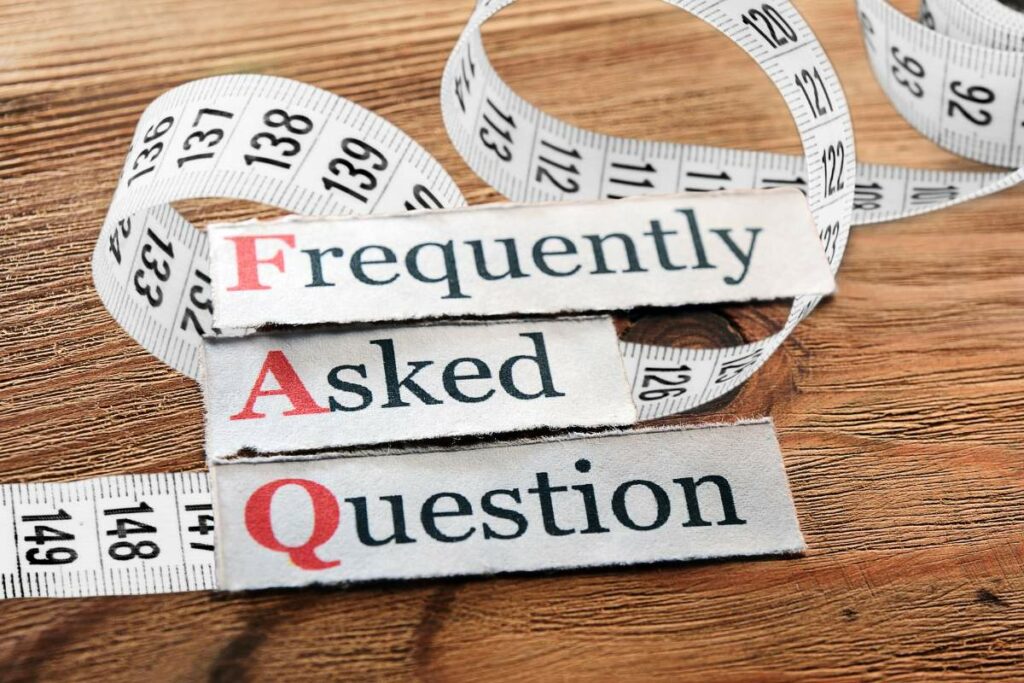What to Eat on Semaglutide to Maximize Weight Loss
Semaglutide has been the buzzword echoing through conversations everywhere lately, capturing the attention of everyone from social media influencers to the people living next door.
This surge of interest is undeniable, and yet, I hesitated to even write this article. The opinions on Semaglutide are deeply polarized, sparking debates and controversies that can’t be ignored.
Admittedly, I found myself on the fence, initially skeptical about the concept of using this method for weight loss.
It felt like a shortcut, a way to bypass the effort typically associated with shedding pounds.
But here we are, diving into the heart of the matter!
If you’re curious about why Semaglutide has become such a hot topic and how it might not be what you initially thought, you’ve landed in the perfect spot.

This post may contain affiliate links, which helps keep this content free. Please read our disclosure for more info.
What is Semaglutide and How Does it Work?
What initially emerged as a treatment for type 2 diabetes has transformed into a revolutionary tool in the battle against obesity.
Semaglutide, this medical marvel, has opened new doors for those striving to manage their weight with greater efficacy.
Far from being just another treatment, it has quickly become a pivotal player in the world of weight management, celebrated for its dual ability to suppress appetite and enhance insulin sensitivity.
By closely mimicking the GLP-1 (glucagon-like peptide-1) hormone that naturally occurs in our bodies, Semaglutide takes a sophisticated approach to curb hunger.
This hormone, integral to our appetite and insulin regulation, when boosted by Semaglutide, helps reduce the urge to eat excessively.
Consequently, those on Semaglutide often find themselves consuming fewer calories due to a significant reduction in cravings, making the journey towards weight loss feel less about deprivation and more about making healthier choices naturally.
Moreover, Semaglutide’s capacity to improve insulin sensitivity is a game-changer, especially for individuals with type 2 diabetes or those at heightened risk of developing such conditions.
Enhanced insulin sensitivity means the body can manage blood sugar levels more adeptly, preventing the highs and lows that can affect energy levels and overall well-being.
When on a Semaglutide regimen, individuals might notice a profound transformation in how their bodies (and minds) relate to food.
The overpowering cravings that once dictated dietary choices begin to wane, empowering individuals to select foods that nourish and satisfy without the burden of excessive hunger.
Plus, life on Semaglutide is marked by the stabilization of blood sugar levels, contributing to a more consistent energy flow throughout the day.
In essence, Semaglutide offers a holistic approach to weight management. It doesn’t simply focus on one aspect of the weight loss process but addresses the complex interplay between appetite, calorie intake, and insulin efficiency.
Common Misconception about Semaglutide – isn’t it cheating?

When tackling the common misconceptions about Semaglutide, it’s crucial to reframe our understanding of this medication as a form of biological technology.
Just as technology evolves to make our lives more efficient and connected, so too does medical science advance to better address our health needs.
Viewing Semaglutide through this lens can significantly shift perspectives, making it easier to appreciate its role in weight management.
Comparing Semaglutide to the evolution from rotary phones to smartphones illustrates why embracing this medical advancement makes sense.
In the same way we wouldn’t cling to outdated technology when better, more efficient options exist, it seems counterintuitive to dismiss the benefits Semaglutide offers in the battle against obesity.
Why would we deny ourselves access to the latest and greatest achievements in medical science? In other words, Semaglutide isn’t about seeking an easy way out; it’s about leveraging modern science to enhance our health outcomes.
To label the use of Semaglutide as ‘cheating’ in weight management oversimplifies the complexities of obesity.
This condition is influenced by a myriad of factors, including genetics, environment, and lifestyle.
Semaglutide acts as a supportive tool in this context, one that complements dietary adjustments and physical activity rather than replacing them.
It equips individuals with a means to control their appetite more effectively, facilitating the challenging process of making healthier lifestyle changes.
The concept of using tools to improve our lives is not new. Just as we use smartphones to streamline communication and organize our daily activities, Semaglutide can be seen as a tool to streamline the physiological aspects of weight control.
It’s an aid in a multifaceted approach to weight loss, requiring a commitment to diet and exercise for optimal results.
In essence, dismissing Semaglutide’s role in weight management overlooks the broader picture of what it represents: a significant step forward in our ability to treat and manage obesity.
Embracing this form of biological technology can be a key element in giving individuals a better chance at achieving and maintaining a healthy weight.
By using Semaglutide responsibly, under the guidance of healthcare professionals, we’re not circumventing the hard work involved in weight loss; we’re enhancing our capabilities to tackle it head-on, armed with the best tools science has to offer.
Another Common Misconception about Semaglutide – Won’t I just gain the weight back when stopping the injections?

A concern that often arises with any weight loss treatment, including Semaglutide, is the possibility of regaining the weight once the treatment stops.
It’s a valid concern, but it overlooks the fundamental purpose and approach of Semaglutide as part of a broader lifestyle change.
Semaglutide isn’t just a temporary fix; it’s a tool designed to facilitate significant lifestyle adjustments.
The true value of Semaglutide lies in its ability to help you adopt new, healthier habits concerning diet and exercise.
While Semaglutide can assist in managing your appetite and improving insulin sensitivity, the long-term success in maintaining weight loss depends largely on the lifestyle changes you implement while using the medication.
Adopting a healthier lifestyle through balanced nutrition and regular physical activity is essential for long-term weight management.
The habits you develop while on Semaglutide—such as eating a nutrient-rich diet, staying hydrated, managing portion sizes, and incorporating regular exercise—are meant to be sustained beyond the period of medication use.
When you approach Semaglutide treatment with the mindset of making permanent lifestyle changes, the transition off the injections becomes less about the fear of regaining weight and more about continuing the healthy journey you’ve already begun.
Put simply, if you go back to an unhealthy lifestyle, you will gain the weight back. Duh…
Nutritional Guidelines on Semaglutide
A well-balanced diet complements the work of Semaglutide, magnifying its benefits and ensuring your body is fueled with the right nutrients for optimal functioning.
Let’s see how you can tailor your eating habits to support your Semaglutide treatment effectively.
Recommended Foods

High-fiber Foods
Fiber is a powerhouse nutrient that plays a key role in weight management. Foods high in fiber, such as fruits, vegetables, and whole grains, help you feel satiated longer, reducing the temptation to snack unnecessarily.
Fiber also supports digestive health, ensuring that your gastrointestinal system runs smoothly.
Lean Proteins
Proteins are the building blocks of muscle, and lean sources like chicken, fish, and plant-based options ensure you’re repairing and growing muscle without adding excess fat.
This aspect becomes even more critical when you’re on Semaglutide, considering the significant role muscle mass plays in enhancing metabolism and facilitating weight loss.
It’s important to note that during weight loss, it’s inevitable that some muscle mass will be lost along with fat.
Prioritizing protein intake becomes crucial in this context as it can help minimize the loss of lean muscle mass, ensuring that your body remains strong and metabolic rates stay elevated.
The importance of protein in your diet cannot be overstated, especially when undergoing weight loss.
Consuming adequate amounts of lean protein supports the maintenance and growth of lean muscle mass, which is often at risk during dieting phases.
Losing muscle mass can slow down your metabolism, making it harder to lose weight and easier to gain it back.
That’s why, alongside prioritizing protein, we strongly recommend incorporating a strength training program into your routine.
Strength training not only helps increase muscle mass but also ensures that your body becomes more efficient at burning calories, even at rest.
By focusing on both protein intake and strength training, you give your body the best chance to retain and build muscle, fueling a more effective and sustainable weight loss journey.
Low-glycemic Index Carbohydrates
Carbohydrates that are low on the glycemic index (GI) are crucial for maintaining steady blood sugar levels.
Foods like sweet potatoes, quinoa, and certain whole grains release glucose into the bloodstream slowly, preventing spikes in blood sugar that can lead to energy crashes and increased hunger.
Healthy Fats
Don’t shy away from fats—just choose the right ones. Avocados, nuts, and seeds are rich in monounsaturated and polyunsaturated fats, which are beneficial for heart health and can keep you feeling full and satisfied.
Foods to Limit or Avoid
To make the most out of Semaglutide for weight management, paying attention to what you eat (and DO NOT eat) is just as crucial as the treatment itself.
Certain foods and substances can interfere with your goals and the effectiveness of Semaglutide, making it important to know which items to reduce or steer clear of.

High-sugar Foods
Sugary treats and beverages are known culprits for causing spikes in blood sugar levels.
When you’re using Semaglutide, the objective includes stabilizing these levels to aid in managing your appetite and weight.
Regular consumption of high-sugar items can lead to fluctuations that not only counteract Semaglutide’s benefits but can also trigger cravings and a cycle of high and low energy levels.
Reducing your intake of such foods is a proactive step towards ensuring the treatment works as efficiently as possible.
Processed and High-fat Foods
Processed items frequently come packed with unhealthy fats, alongside significant amounts of salt and sugar.
These components can undermine the positive effects of Semaglutide by promoting inflammation, weight gain, and other health issues.
By choosing whole, unprocessed foods, you’re investing in your body’s nutritional needs and supporting the Semaglutide treatment to perform at its best.
Whole foods provide essential vitamins, minerals, and other nutrients in their most natural form, contributing to overall health and well-being.
Alcohol and Caffeine
Alcohol and caffeine are substances that can influence your body in various ways, including impacting blood sugar levels and altering your appetite.
While enjoying these in moderation might not derail your progress, it’s beneficial to consider their potential effects.
Alcohol, for instance, can add a significant calorie load and disrupt your ability to make healthy food choices.
Caffeine, on the other hand, may affect hydration and sleep patterns, which are crucial for weight management.
Assessing how these fit into your lifestyle and potentially adjusting your intake can enhance the effectiveness of your Semaglutide treatment and help you reach your health goals more smoothly.
It’s worth noting that consuming high-sugar foods, processed items, and indulging in alcohol and caffeine doesn’t just slow down the effectiveness of Semaglutide; these food choices are also known to exacerbate the medication’s negative side effects.
Foods and drinks high in sugar or unhealthy fats, along with alcohol and caffeine, can intensify feelings of tiredness, nausea, vomiting, diarrhea, and constipation among others.
By making more informed dietary choices, you’re not only aiding the effectiveness of Semaglutide in managing your weight but also potentially reducing the severity and frequency of these uncomfortable side effects.
Staying Hydrated

Staying hydrated is a cornerstone of good health, and its importance escalates when you are on Semaglutide.
Water isn’t just a basic necessity; it’s a crucial ally in your weight management efforts and in maximizing the effectiveness of Semaglutide.
Here’s a closer look at why hydration should be a top priority, especially when undergoing treatment with Semaglutide.
Enhances Semaglutide’s Efficacy
Proper hydration can significantly enhance the effectiveness of Semaglutide. Water facilitates the proper absorption of medications, ensuring that Semaglutide is efficiently utilized by your body.
This optimal absorption is vital for the medication to work as intended, helping you to achieve the best possible outcomes in your weight management journey.
Alleviates Side Effects
Semaglutide, like any medication, can come with side effects, including nausea, constipation, and headaches.
Staying well-hydrated helps to mitigate these effects by ensuring that your body’s systems are functioning smoothly.
For example, adequate water intake can improve digestive regularity, reducing the likelihood of constipation and discomfort.
Similarly, staying hydrated can help prevent or alleviate headaches and reduce feelings of nausea.
Supports Detoxification Processes
Water plays a crucial role in the body’s natural detoxification processes. By helping to flush out toxins and waste products, water supports the liver and kidneys in their vital functions.
This detoxification is particularly important when your body is adjusting to a new medication like Semaglutide, as it can help to reduce potential side effects and promote overall well-being.
Aids in Appetite Control
One of the key benefits of Semaglutide is its ability to suppress appetite, making it easier to adhere to a calorie-controlled diet.
Drinking enough water can further enhance this effect. Often, our bodies can misinterpret signals of dehydration as hunger.
By staying adequately hydrated, you can more accurately interpret your body’s signals, reducing unnecessary snacking or overeating.
Tips for Success
Success with Semaglutide involves more than just taking your medication as prescribed. How you manage your diet and prepare your meals can significantly impact your experience and outcomes.

Managing Side Effects Through Diet
Side effects are a consideration with any medication, and Semaglutide is no exception. However, the impact of these side effects can often be mitigated with thoughtful dietary choices:
- Fiber for Digestive Health: If you’re experiencing digestive issues like constipation or diarrhea, increasing your intake of fiber can offer relief. Fiber helps regulate digestion and can alleviate constipation by adding bulk to your stool. Sources like fruits, vegetables, whole grains, and legumes are not only rich in fiber but also packed with nutrients that support overall health.
- Ginger for Nausea: Nausea is a common side effect for some people on Semaglutide. Incorporating ginger into your diet, a natural remedy for nausea, can help soothe your stomach. Ginger tea or even ginger supplements are practical options.
- Small, Frequent Meals: For those experiencing nausea or a lack of appetite, eating small, frequent meals rather than three large ones can help ensure you’re getting enough nutrients without overwhelming your digestive system.
- Hydration: As mentioned, staying hydrated is crucial. Water can help manage side effects like nausea and constipation and is essential for overall health.
The Importance of Meal Planning and Preparation
Meal planning and preparation are your best defenses against the convenience of unhealthy food choices that can derail your progress:
- Meal Planning: Start by planning your meals for the week. This doesn’t just help you stay on track with healthier eating habits; it also ensures you have all the ingredients you need, reducing the likelihood of reaching for less healthy convenience foods. Consider your schedule for the week and plan meals that fit your availability to cook and eat, including preparing in bulk for busier days.
- Preparation Techniques: Preparing meals in advance can save time and stress during the week. Techniques like batch cooking or preparing and freezing meals can ensure that you have healthy options on hand. This approach is especially helpful for managing portion sizes and controlling what goes into your food.
- Smart Snacking: Plan for healthy snacks to avoid the temptation of high-sugar or processed options. Having cut vegetables, nuts, or fruit at hand can satisfy hunger pangs without compromising your dietary goals.
- Mindful Eating: Pay attention to what you eat and enjoy each meal without distractions. This can help you recognize satiety cues and enjoy the flavors of your food, making it easier to stick to your eating plan.
Elevate Your Semaglutide Results with Avocadu’s 21-Day Fat Loss Challenge
Avocadu’s 21-Day Fat Loss Challenge synchronizes perfectly with your Semaglutide injections, providing a streamlined and efficient path to weight loss. This program strips away all the unnecessary fluff, focusing solely on what’s proven to work. Here’s what makes it a perfect companion to your weight loss efforts:

Simple Eating Instructions: You’ll never be left guessing what to eat next. The challenge provides easy-to-follow guidelines on what to eat and when, simplifying your diet without sacrificing satisfaction or nutrition.
Three-Stage Diet Plan: To maximize the effectiveness of your efforts, the diet plan is strategically divided into three phases:
- Detox Stage: Kick off your challenge by cleansing your body, setting a solid foundation for the subsequent stages.
- Maximum Glycogen-Processing Stage: Transition into a phase designed to optimize your body’s glycogen processing, enhancing fat burning and energy levels.
- Personalization Stage: Tailor the plan to fit your unique goals, ensuring the final stretch is aligned with your personal weight loss objectives.
The Motivation Guide: Staying on track is easier with the included motivation guide, packed with inspiration and strategies to keep your spirits high and your focus sharp.
At-Home Workout Plan: Complement your diet efforts with an accessible at-home workout plan. No need for a gym membership or fancy equipment; these exercises are designed to fit into your routine, regardless of your fitness level.
Private Community Support Group: Perhaps the most powerful tool in your arsenal, the private community support group offers an environment of support and accountability. Connect with others who are on the same journey, share your experiences, and find motivation in the collective pursuit of health goals.
When paired with Semaglutide injections, Avocadu’s 21-Day Fat Loss Challenge is more than just a diet plan—it’s a comprehensive approach to achieving and maintaining a healthier weight.
With its clear instructions, phased approach, motivational support, practical workout options, and a supportive community, it empowers you to make sustainable changes for lasting health improvements.
Frequently Asked Questions (FAQ)

Q: Can anyone use Semaglutide for weight loss?
A: Semaglutide is typically prescribed for individuals with type 2 diabetes or those who are obese and have at least one weight-related condition, such as high blood pressure, type 2 diabetes, or high cholesterol. It’s important to consult with a healthcare provider to determine if Semaglutide is appropriate for your specific health situation.
Q: How does Semaglutide help with weight loss?
A: Semaglutide works by mimicking a hormone that regulates appetite and food intake, leading to reduced hunger and calorie intake. Additionally, it improves insulin sensitivity, which can help manage blood sugar levels more effectively.
Q: Are there any side effects of using Semaglutide?
A: Yes, like all medications, Semaglutide can have side effects. Common ones include nausea, vomiting, diarrhea, abdominal pain, and constipation. More serious side effects are rare but can occur. Discuss potential side effects with your healthcare provider.
Q: How long do I need to use Semaglutide?
A: The duration of Semaglutide treatment varies from person to person, depending on individual health goals and how well the body responds to the medication. Continuous evaluation by a healthcare provider is essential.
Q: Can I stop taking Semaglutide once I reach my weight goal?
A: Stopping Semaglutide should be done under the guidance of a healthcare provider. It’s important to transition carefully to maintain weight loss and continue with lifestyle changes in diet and exercise.
Q: How important is diet and exercise when taking Semaglutide?
A: Diet and exercise are crucial components of a weight management plan with Semaglutide. The medication is most effective when combined with a healthy diet and regular physical activity.
Q: What should I do if I experience side effects from Semaglutide?
A: If you experience side effects, contact your healthcare provider. They may adjust your dosage or suggest other ways to manage side effects.
Q: Can Semaglutide be used with other weight loss medications?
A: Combining Semaglutide with other weight loss medications should only be done under the guidance of a healthcare provider to avoid adverse interactions.
Q: Is Semaglutide covered by insurance?
A: Coverage for Semaglutide varies by insurance plan. Check with your insurance provider to understand your coverage and any out-of-pocket costs.
Q: How does Avocadu’s 21-Day Fat Loss Challenge complement Semaglutide treatment?
A: Avocadu’s 21-Day Fat Loss Challenge offers structured meal plans, motivational support, and fitness advice that align with the weight loss goals of Semaglutide treatment. It’s designed to help you make sustainable lifestyle changes, enhancing the effectiveness of the medication.

